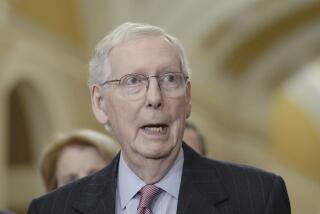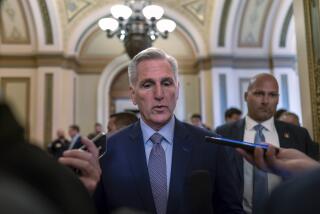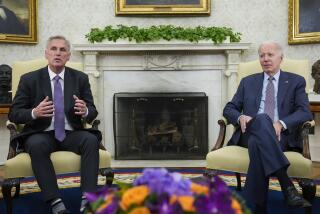Ailing John McCain to make dramatic return to Senate today for key healthcare vote

McCain, who was recently diagnosed with an aggressive form of brain cancer, explained why he would not vote for the GOP bill to repeal the Affordable Care Act.
Reporting from Washington â With a strong, last-minute push from President Trump, Senate Republicans face a pivotal vote Tuesday in their long bid to repeal or replace the Affordable Care Act.
But the outcome remained in doubt, largely because senators have not even been told which of the various GOP plans will be considered.
Senate Majority Leader Mitch McConnell has kept the process highly secretive as he tries to find a path forward amid stark opposition within his Republican majority, and no backing from Democrats. He has only two Republican votes to spare.
In a sign of the voteâs importance, Republican Sen. John McCain of Arizona â who was diagnosed last week with brain cancer following an operation to remove a blood clot â announced late Monday he would return to Washington in time for Tuesdayâs proceeding.
But many GOP senators remain reluctant to begin formal debate on legislation without knowing where the process will end.
Trump warned senators Monday that Tuesdayâs planned âmotion to proceedâ â the first legislative hurdle to passing a Senate bill â could be Republicansâ âlast chanceâ to undo the Affordable Care Act, also known as Obamacare.
He warned in a tweet that âthe repercussions will be far greater than any of them understand!â â hinting of political fallout for senators who vote against the measure.
âAny senator who votes against starting debate is telling America that you are fine with the Obamacare nightmare,â Trump said during an event at the White House.
âFor Senate Republicans this is their chance to keep their promise. Over and over again they said ârepeal and replace, repeal and replace,ââ he said. âThereâs been enough talk and no action. Now is the time for action.â
For Trump, a failure Tuesday could expose the limits of his ability to implement his agenda, even with a GOP-controlled Congress.
But neither admonitions from the White House nor pressure from outside conservative groups seemed strong enough to sway some key centrist Republican senators, who continued to express concerns about how the GOP plan might affect low-income residents in their states, particularly those receiving Medicaid.
The nonpartisan Congressional Budget Office estimated that at least 22 million more Americans would not have coverage under the Republicanâs repeal and replace plan, and as many as 32 million would join the ranks of the uninsured if Republicans simply repealed the Affordable Care Act.
Among the holdouts is Sen. Shelley Moore Capito of West Virginia, a state with a greater share of its population covered by Medicaid than any other. Trump traveled there Monday evening for a rally at the National Jamboree of the Boy Scouts of America.
âMany West Virginians have benefited from our stateâs decision to expand Medicaid,â Capito wrote in her weekly newsletter ahead of the visit. âI am committed to repealing Obamacare and replacing it with a healthcare system that provides access to affordable care to West Virginians... After meeting with President Trump this week, he assured me we are on the same page.â
During his remarks in West Virginia, Trump told his Health and Human Services Secretary Tom Price, âYouâd better get Sen. Capito to vote for it.â
Otherwise, Trump joked, if Price doesnât produce the needed Senate votes, âYouâre fired!â
Ahead of Tuesdayâs vote, at least one Republican, Sen. Susan Collins of Maine, remained opposed to opening debate on the bill.
McConnell can afford to lose no more than two Republicans from his 52-seat majority. If needed, Vice President Mike Pence could be called on to cast a tie-breaking vote.
With McCainâs unexpected return, GOP leaders are hoping they will be able to garner at least 50 votes. Though the Arizona senator has not indicated how he would vote, it seemed unlikely that he would make the trip to vote âno.â He also expressed a desire to vote on other pressing issues, such as a defense authorization bill and Russia sanctions legislation.
Some Republican senators who initially said they would oppose opening debate on the bill, including Sen. Rand Paul of Kentucky, have since indicated they may be willing to start debate.
Paul and other conservatives support repealing Obamacare but oppose the latest version of the replacement plan, saying it did not go far enough in dismantling the current law.
Among the centrists, the votes of Capito and Sen. Lisa Murkowski (R-Alaska) remained the most closely watched.
Also not saying how he would vote was Sen. Mike Lee of Utah, who had joined Paul in opposing the replacement plan.
McConnell nudged senators forward, promising a free-wheeling floor debate that would allow both GOP centrists and conservatives an opportunity to offer amendments to shape the final product.
âWe ought to have the debate,â McConnell said Monday.
âThe only way weâll have an opportunity to consider ideas is if senators are allowed to offer and debate them,â McConnell said. âThat means voting to kick off a robust debate.â
Senators, though, remained skeptical that their amendments would be included in the final product. Many, including McCain, have called for a return to a traditional legislative process of holding public hearings and debating the bill in committee before pushing it to the floor.
Itâs highly unusual for senators to vote to proceed on such an important piece of legislation without knowing the preferred plan of GOP leadership.
Technically, the vote Tuesday will be to proceed to the House-passed Obamacare overhaul, the American Health Care Act, which has almost no support in the Senate.
After crossing that initial hurdle, GOP leaders will substitute the House version with the Senate-preferred alternative. But as late as Monday evening, it was unclear which version GOP leadership preferred: a simple repeal or repeal and replace.
Even if McConnell succeeds Tuesday in bringing enough senators to support beginning debate on a bill, final passage remains a challenge.
McConnell appears to be calculating that itâs better to hold Tuesdayâs vote and risk an embarrassing defeat in the hopes it will pressure senators to find consensus.
The leader has promised to keep senators in session through the first two weeks of August, cutting into their summer recess, to pass a final bill, meaning Tuesdayâs vote may not be their last.
UPDATES:
6:45 p.m.: This story was updated after Sen. John McCain announced he would return to Washington for the vote.
This story was originally published at 3:40 p.m.
More to Read
Get the L.A. Times Politics newsletter
Deeply reported insights into legislation, politics and policy from Sacramento, Washington and beyond. In your inbox three times per week.
You may occasionally receive promotional content from the Los Angeles Times.












